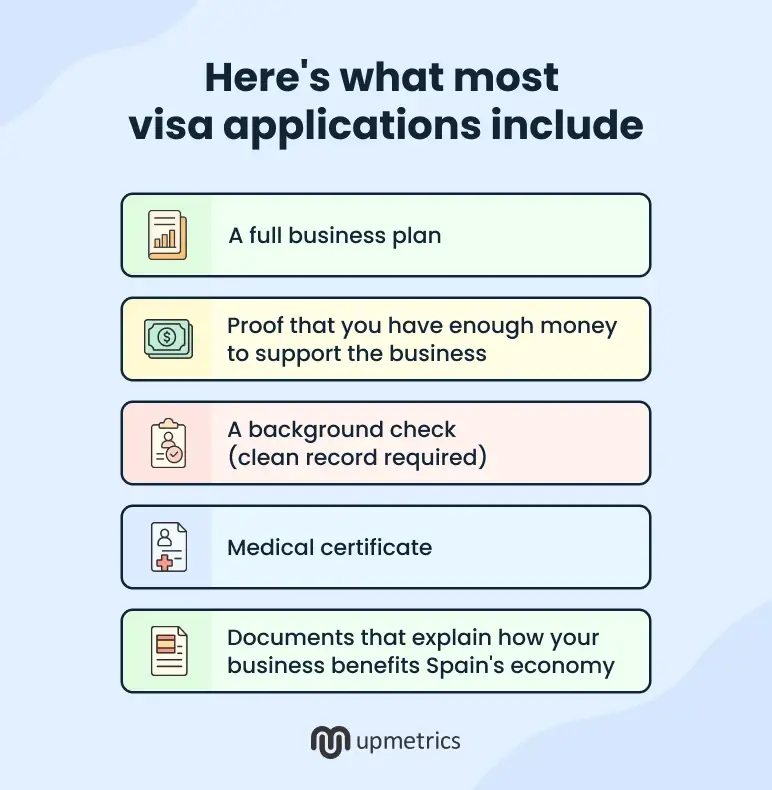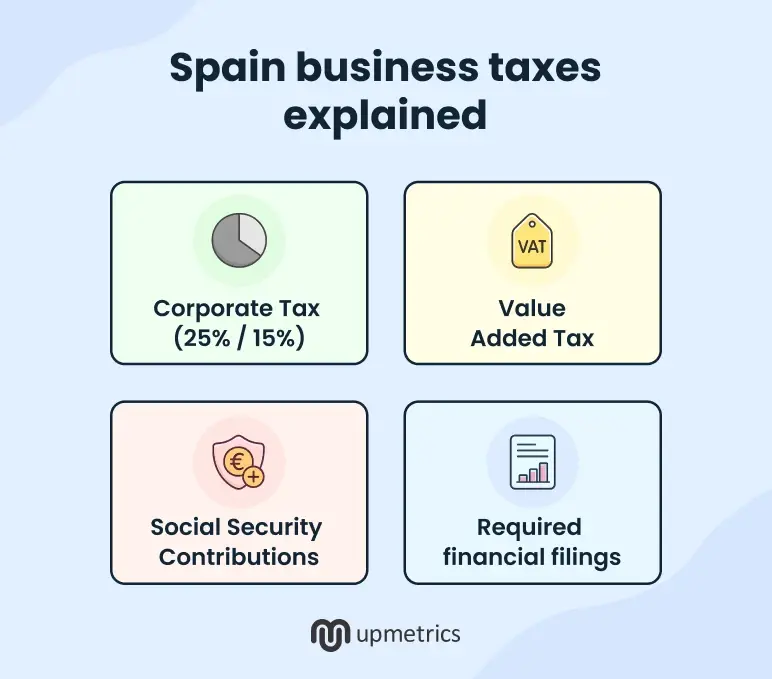Starting a business in Spain sounds simple. That’s until you start doing it! The paperwork piles up fast, the rules shift depending on your passport, and some of the requirements feel like they were designed to test your patience.
Spain’s process is strict about order. Shortcuts usually turn into setbacks. One wrong move, like picking the wrong company type or missing a deadline, can result in losing time, paying more tax, or both.
This blog covers how to start a business in Spain from the ground up. From NIEs to tax setup and hiring, everything you need is here without any legal fog.
Pros and cons of starting a business in Spain
Spain checks a lot of boxes for starting a business. But, like anywhere in the world, documentation is an important aspect. Here’s a quick look at what Spain gets right and where things can get a little tricky.
Pros
- EU access and Latin American ties make Spain great for global business.
- Startup-friendly laws support easier setup, tax relief, and visa access.
- High quality of life helps attract and retain talent.
Cons
- Slow bureaucracy with lots of steps and delays.
- Language hurdles due to Spanish-only paperwork.
- High hiring costs from employer social security contributions.
If the pros outweigh the cons for you, the next question is whether you’re eligible to start. Let’s look at who can legally set up a business in Spain.
Who can start a business in Spain?
Anyone looking to start and launch a business in Spain, whether local or foreign, can do so, provided they possess the residency requirements. Depending on where you come from, the process of getting underway may include a couple of extra steps.
The core legal process of registering a business remains the same for everyone. What changes is the residency requirement, which you’ll need to meet before moving forward.
Here’s how it works in both cases:
- EU/EEA citizens: You’ll need to get your Número de Identidad de Extranjero (NIE) and European Union (EU) registry certificate, and then you can begin the business setup.
- Non-EU citizens: A valid working visa or residency permit is required before you can register and operate a business in Spain.
Once the residency part is handled, starting a business in Spain as a foreigner becomes a matter of following the right steps in the right order.
Steps to start a business in Spain (even as a foreigner)
No matter where you’re from, the steps to start a business in Spain are the same once you’re legally eligible. Here’s how the process works, start to finish.
Step 1: Create a business plan
Starting a business is tough enough. Doing it in a country with unfamiliar rules, tax codes, and market behavior is a different game altogether. But a proper business plan can keep things from falling apart before they even begin.
You’re not just writing this for investors or government evaluators. You’re writing it to determine if your idea actually works in Spain, including what it costs, what it earns, and what needs to happen for it to survive.
The plan should include key business plan components like:
- Real market demand within Spain or the European Union
- Financials that make sense and hold up under review
- Timelines and traction milestones
- Prove that you’ve thought through operations, taxes, and hiring
Once you’ve got the content mapped out, you can either write it yourself, work with a consultant, or use a planning tool like Upmetrics to speed things up. What matters is that it’s clear, specific, and ready to hold up to scrutiny.
Need help creating your business plan
Make detailed business plan using Upmetrics AI
Plans starting from 14/month

Step 2: Legal requirements for foreign entrepreneurs
You can’t move forward with opening a business in Spain until you’re legally set up to operate in Spain. Start with the basics: Your residency status and your NIE.
NIE (Número de Identificación de Extranjero)
The NIE is your personal tax ID in Spain. You’ll use it for everything like opening a bank account, registering your company, paying taxes, signing contracts, and dealing with public offices. You can apply for the NIE at:
- A Spanish consulate in your home country
- The local Foreigners Office (Oficina de Extranjeros) in Spain
- Some designated police stations
The process involves paperwork (of course), passport copies, a form stating why you need it (starting a business is valid), and sometimes an appointment you didn’t know you needed.
Turnaround time ranges from a few days to a couple of weeks, depending on where and how you apply.
You can apply for the NIE at a Spanish consulate in your home country or at the Oficina de Extranjeros in Spain. For detailed information and application forms, visit the Ministry of Foreign Affairs.
Visa and residency permits
If you’re from the EU or EEA, things are simpler. You don’t need a business visa. But if you plan to stay in Spain long-term, you’ll still need to: Get your NIE and register as a resident
That’s all. Once those two are sorted, you’re free to start your business setup.
If you’re from outside the EU, you’ll need a visa that allows you to run a business. This step takes more time, so plan ahead.
Here’s what most visa applications include:

Processing usually takes 2 to 4 months. Starting this early can save you from long delays later. To speed things up, especially for non-EU applicants, here’s a practical guide on how to write a business plan that matches Spain’s startup and visa expectations.
Step 3: Select the right company structure
The legal structure of your business, which you pick on day one, will shape how much tax you pay, how protected your personal finances are, and how much paperwork follows you around.
Sole Proprietorship (Autónomo)
This setup works well for freelancers, solo consultants, or anyone starting small. Registration is simple, and there’s no minimum capital needed.
But your business and personal finances are legally the same. If things go wrong, your savings and personal assets are on the line. Profits are taxed as personal income, and you’ll be filing VAT and income taxes every quarter.
Some founders start as autónomos to test their idea, then switch to a company structure once things grow.
Limited Liability Company (Sociedad Limitada – S.L.)
The most popular choice for small to mid-sized businesses. It separates your personal assets from the business, which gives you protection if things don’t go as planned.
You’ll need €3,000 in share capital. Technically, the law now allows you to start with €1, but that comes with creditor protection rules most people prefer to avoid.
An S.L. pays corporate tax at 25%, with a reduced 15% rate for the first two profitable years. That helps when you’re trying to scale early. There’s more paperwork, including annual accounts and formal bookkeeping, but it adds credibility if you’re working with investors, suppliers, or banks.
Public Limited Company (Sociedad Anónima – S.A.)
This structure works best for larger businesses with significant capital, big growth plans, or future public funding goals.
You’ll need €60,000 in capital, with at least €15,000 paid upfront. S.A. companies can issue public shares and even list on stock exchanges, but they come with stricter rules, more admin, and higher setup costs.
Most early-stage or foreign entrepreneurs don’t go this route unless they’re building something large from day one.
Branch or Subsidiary
This option is designed for foreign companies looking to expand into Spain while keeping ties to their existing business.
A branch acts as an extension of the parent company. It’s registered in Spain, but liability still falls to the original company abroad.
A subsidiary, on the other hand, is its own legal entity, usually an S.L. or S.A., and is owned by the parent business. This setup offers more control, limits liability, and simplifies accounting.
Most small and mid-sized foreign businesses choose a subsidiary for long-term flexibility and clearer separation.
For a comprehensive overview of each structure, refer to the administracion.gob.es.
Step 4: Setting up your business
With the legal groundwork done, the next phase is registration, filings, and getting everything in place to operate legally.
| Step | Requirement | Details | Timeline |
|---|---|---|---|
| NIE Application | Foreigner ID Number | Apply at the consulate or the Foreigners Office with your passport and business justification | 1-5 days |
| Bank Account Opening | Spanish business account | Deposit minimum share capital (€3,000 for S.L.) and obtain a certificate | 1-2 weeks |
| Name Registration | Company name reservation | Submit a request to the Central Mercantile Registry for a name availability certificate | 3-7 days |
| Articles of Association | Constitutional documents | Draft company structure, governance rules, and operational details | 1-2 weeks |
| Deed of Incorporation | Notarial execution | Sign public deed before notary with all required documentation | 1 day |
| Mercantile Registry | Official registration | Submit deed for formal company registration and tax ID assignment | 2-4 weeks |
| Tax Registration | NIF and VAT setup | Register for corporate tax ID and VAT number with tax authorities | 1-2 weeks |
| Social Security | Employment registration | Enroll company and employees/directors in social security system | 1-2 weeks |
| Licenses & Permits | Activity-specific authorization | Obtain municipal, health, or industry-specific permits as required | Variable |
Step 5: Taxation & financial considerations
Business registration isn’t complete without understanding your financial responsibilities. These are the core requirements you’ll need to manage from day one. Good financial projections can prepare you for these obligations and help avoid early compliance issues.
- Corporate Tax: Companies in Spain pay a 25% corporate tax rate. New businesses benefit from a 15% reduced rate for the first two profitable years.
- Value Added Tax (VAT): Spain’s VAT is 21% (with reduced rates of 10% and 4% for some items), and you must register for both NIF and VAT through the Agencia Tributaria before charging customers.
- Social Security Contributions: Employers must contribute around 30% and employees about 6–7% of gross salary to social security, registered through the Tesorería General de la Seguridad Social (TGSS).
- Accounting & Reporting: All companies, regardless of company size or industry, are required to maintain accurate accounting records and submit annual financial statements to the Mercantile Registry.

Step 6: Hiring employees in Spain
Hiring in Spain involves a few administrative and legal requirements. It’s not very complicated, but does necessitate rules, timelines, and contracts to be kept in mind.
Employment contracts
All employees must be hired under a written contract. Common types include permanent, temporary, part-time, and trainee contracts. Each format comes with different terms for duration, probation periods, notice requirements, and termination.
Contracts must clearly define responsibilities, salary, working hours, and benefits, and they must be submitted to the regional employment office within the legal timeframe after signing.
Labor laws
Working hours are restricted to 40 per week under normal full-time employment. Workers have a minimum of 30 calendar days of paid annual leave, plus national and regional public holidays. Rules also cover sick leave, maternity and paternity leave, and required rest periods.
Social Security & Payroll
Before the employment start date, every worker must be registered with the Tesorería General de la Seguridad Social (TGSS). This step provides access to healthcare, pension, and other public benefits. Monthly payroll must include income tax withholdings and social security contributions from both the employer and employee.
Step 7: Navigating culture & language barriers
Most forms won’t warn you about cultural differences. How people communicate, follow up, or handle delays can vary. Learning those patterns early makes things smoother when your team or clients start expecting a rhythm you weren’t briefed on.
Most legal documents, tax filings, and government procedures happen entirely in Spanish. English isn’t widely used in public offices, so hiring a certified translator or local consultant helps avoid misunderstandings and missed deadlines. In daily operations, bilingual staff can make things easier, and even basic Spanish on your end goes a long way.
There are also cultural differences to consider. Meetings tend to be structured, but personal connection still plays a role. Expectations can vary by region, especially where local languages like Catalan or Basque are part of daily life. So, take time to understand how people work.
Step 8: Common challenges & how to overcome them
Some parts of setting up a business in Spain take more patience than planning. Bureaucracy has the effect of slowing things down, particularly if paperwork has to go through several offices. Despite that, economically active businesses in Spain grew by 1.5% in 2023 to stand at 3.25 million.
Though each step might look simple on paper, missing one form or deadline can easily set you back. Local consultants can help with this as they know where to go, what to file, and which office is open when.
Even after setup, staying compliant takes ongoing attention. Labor rules, tax regulations, and licensing requirements shift more often than many business owners expect. Without a system to track changes, things can slip through.
On the competitive side, jumping into a market without proper research usually means overestimating demand or running into a saturated niche. A bit of local insight upfront goes a long way in keeping things stable after launch.
Getting through the setup is a big milestone. From here, the focus shifts to finding the right support systems to keep things moving forward.
Resources & support for entrepreneurs
Starting a business in Spain comes with paperwork, but it also comes with support. Founders, particularly those who are migrating from overseas, can access organized resources that will make the establishment smoother and better informed.
Government programs and institutions
- ICEX – Invest in Spain: Offers support for international businesses establishing operations in Spain, including the “Rising UP in Spain” program.
- ENISA (Empresa Nacional de Innovación S.A.): Provides government-backed participative loans ranging from €25,000 to €1.5 million.
- Catalonia Trade & Investment (ACCIÓ): Supports foreign companies in establishing operations in Catalonia.
Incubators and Accelerators
- Barcelona Activa: Provides incubation services, training, and support for entrepreneurs in Barcelona.
- Madrid Emprende: Offers business incubators and support services for startups in Madrid.
- Lanzadera: An accelerator in Valencia that offers various programs for startups at different stages, providing mentoring, funding, and workspace.
- Wayra: Operated by Telefónica, Wayra accelerates tech startups by providing investment, mentoring, and access to a global network.
Business planning tools
- Upmetrics: An online business planning tool that assists entrepreneurs in creating comprehensive business plans, including financial projections and market analysis.
Conclusion
Once your structure is in place, people will start asking for details like how your business operates, what it costs to run, and what makes it viable in the Spanish market. A well-prepared plan gives you those answers in one place. It helps with bank accounts, licenses, visa applications, and even early hiring.
Upmetrics gives you a clear starting point, with templates built to help founders structure their plans professionally. You can outline your model, organize financial projections, and create a plan that meets the expectations of banks, partners, and stakeholders.
Upmetrics includes guided prompts, built-in financial tools, and export options that keep your plan presentation-ready. If you’re setting up a business in Spain, you can adapt the plan to local requirements without starting from scratch.
The Quickest Way to turn a Business Idea into a Business Plan
Fill-in-the-blanks, AI-assistance, and automatic financials make it easy.



